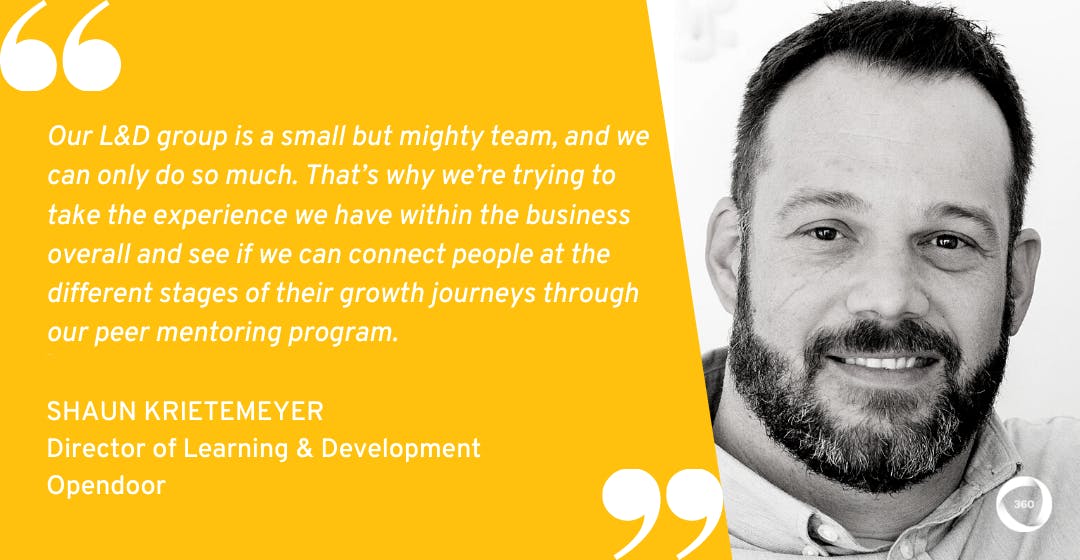Welcome to 2022! As we get underway with the New Year, many of us are looking for new and better ways to connect our teams and deliver great outcomes through peer learning.
That’s why I was so happy to kick off the new year by chatting to Shaun Krietemeyer, Director of Learning and Development at Opendoor, about how he creates lean and impactful learning through peer mentoring.
Shaun had a lot to say about the value of peer mentoring in supporting company growth, nurturing leadership, and much more.
Loving what you’re reading? Come and join the L&D Collective for more great learning insights, resources, and events!
Opendoor’s mission to change the world of real estate
Shaun kicked off our conversation by telling me all about Opendoor’s mission to change the world of real estate transactions.
“At Opendoor, we’re a full-stack tech real estate company based in the United States,” he says. “We’re in the business of creating a single experience for both buyer and seller within the real estate world.”
“We’re looking to reinvent the decades-long industry practices within real estate, and see if we can flip things around and make things a bit easier and faster for both the buyer and the seller.”
As Shaun says, this is an area that’s growing a lot right now–and this growth comes with some new learning challenges for Opendoor.
Looking for a few more CLO Connect expert insights? Find out How to Become the L&D Leader You’ve Always Wanted to Be.
The challenge of balancing learning commitments with rapid growth
For Shaun, Opendoor’s biggest L&D challenge is around balancing learning commitments with the company’s rapid scale of growth right now.
“The big thing for us right now is around scalability,” says Shaun. “We’re part of an industry that has such a high potential for growth, and it’s moving very quickly. There’s not always a lot of time to stop and think about whether we’re doing something correctly. Instead, we have to build the plane as we’re flying it.”
“How do we keep everything successfully moving in the right direction? How can we be sure we’re developing, maintaining, and sustaining our learners to support this growth over time? That’s the biggest challenge we have right now: How do we support our learners with the tools and resources they need while also contributing to our growth?”
Fueling growth with the right learning approach is something I’ve discussed with many other L&D leaders as part of CLO Connect. That’s why I captured the top expert tips from companies like Amazon, WhatsApp, Klaviyo and more in this handy guide on scaling with L&D.
Back to Shaun, and how Opendoor is using one secret weapon to drive lean learning outcomes.
That’s the biggest challenge we have right now: How do we support our learners with the tools and resources they need while also contributing to our growth?
Using peer mentoring to drive lean and impactful learning
For Opendoor, leadership development is key to sustaining the company’s rapid growth. “We’re working on a few things focusing on leadership development,” says Shaun. “This means meeting people where they’re at. We need to take the time to personalize and recognize that not everybody is on the same level footing in their different roles.”
So, how exactly are Shaun and his team providing this leadership development support?
“One big area we’re trying to push and leverage is around a mentoring program,” says Shaun. “The reason being that our L&D group is a small but mighty team, and we can only do so much. That’s why we’re trying to take the experience we have within the business overall and see if we can connect people at the different stages of their growth journeys.”

As Shaun explains, he and his team focus on three key steps during this process.
1. Start by identifying mentors with the right experience
“Right now we’re in the early stages of the peer mentoring approach. We’re identifying pilot groups, resources, and vendors who can help us out through the process. What we’re working on is to identify the right immediate learning needs.”
“We want to match our learners with people who are moving in the same direction, or who have some experiences they can offer to help others move through that journey a little bit easier. It’s something I’ve seen work really well in the past, and we’ve been testing it out in small groups.”
2. Recognize that not all mentoring is created equal
Next up, it’s key to recognize that every mentoring relationship is different. “It’s really important to remember that not all mentoring and coaching is created equal, because people bring different skill sets to the table.”
“You want to make sure you match up mentors with a mentee that’s looking for support with a particular interest, or looking to grow in a certain area. That’s the key step, and it’s something a couple of vendors are helping us with.”
It’s really important to remember that not all mentoring and coaching is created equal, because people bring different skill sets to the table.
3. Know which group of learners will experience the biggest impact
Finally, as Shaun explains, he and the L&D team wanted to start Opendoor’s mentorship program with the right group of learners to create the biggest impact.
“We wanted to start with our mid-manager leadership group, because they have the potential to influence both above and below. They have teams they’re working with, including their own direct reports, and they have leadership above them they need to manage up to as well.”
“By setting these learners up with a mentor, we’re hoping these leaders can start to make their teams more successful, as well as branching out into new areas and competencies.”
This example isn’t just a window into great peer mentoring: it also highlights the changing role of L&D in creating the right peer networks and opportunities for people to learn from each other, rather than simply providing the right courses and training materials.
Related: How We Use Peer Learning to Keep Our Company’s Competitive Edge
By setting these learners up with a mentor, we’re hoping these leaders can start to make their teams more successful, as well as branching out into new areas and competencies.
Measuring the success of Opendoor’s peer mentoring program
So, how does Shaun know whether Opendoor’s mentoring program is having the right impact and supporting growth?
“Impact is always the million-dollar question,” says Shaun. “There’s a couple of things I’m paying attention to, starting with engagement. As a centralized L&D team of around ten people supporting thousands of learners, it’s crucial for us to focus on engagement.”
“If the program is taking off through peer or user recommendation regardless of what we’re doing to market the program as an L&D team, this really helps to make it more sustainable in the long-term. We won’t have to push the program to make sure it’s working.”
Within the question of impact, Shaun is looking hard at the specific learning topics making the biggest difference. “We’re looking at which specific topics our mentors can offer their experience on, and how we tie it back to business impact.”
“For example, If someone is looking to get assistance on how to be a better coach, we can survey a manager’s team after this mentoring and assess the positive impact on the quality of the coaching. Is that person’s team now performing at a higher level as a result?”
As Shaun explains, he’s already seeing some exciting results through Opendoor’s new peer mentoring program. “We’re already seeing how peer mentoring is building new relationships, as well as sparking interest in people to really take ownership of their personal development, rather than relying on us as the L&D team to make things happen.”
Related: 3 Data-Based Ways to Prove Training ROI (+ Free Training ROI Calculator)
If the program is taking off through peer or user recommendation regardless of what we’re doing to market the program as an L&D team, this really helps to make it more sustainable in the long-term.
Thanks again to Shaun for so generously sharing his knowledge and insights with us!
For more expert insights on the power of peer learning, check out our interviews with Joe Dunlap of Toppers Pizza on driving a 40% engagement increase through crowdsourcing, and with Lachlan Fletcher of Instacart on supporting leaders with expert discussion circles.
Want more peer insights on transforming workplace learning? Sign up to become a member of the L&D Collective, and check out our other #CLOConnect interviews with top L&D leaders on driving growth and scaling culture through Collaborative Learning. Or you can subscribe (below 👇) to our weekly newsletter to receive our latest posts directly in your inbox.



